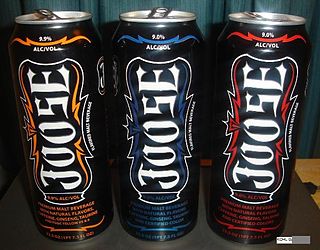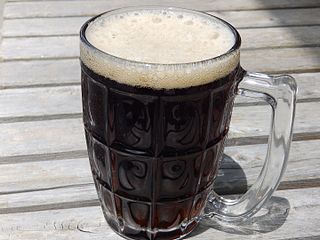Related Research Articles

An alcopop is any of certain mixed alcoholic beverages with relatively low alcohol content, including:
- Malt beverages to which various fruit juices or other flavorings have been added
- Wine coolers: beverages containing wine to which ingredients such as fruit juice or other flavorings have been added
- Mixed drinks containing distilled alcohol and sweet liquids such as fruit juices or other flavourings

Low-alcohol beer is beer with little or no alcohol by volume that aims to reproduce the taste of beer while eliminating or reducing the inebriating effect, carbohydrates, and calories of regular alcoholic brews. Low-alcohol beers can come in different beer styles such as lagers, stouts, and ales. Low-alcohol beer is also known as light beer, non-alcoholic beer, small beer, small ale, or near-beer.

Holsten Brewery is a brewing company founded in 1879 in what is now Hamburg's Altona-Nord quarter. The group now has seven breweries in Germany. Its nationally distributed premium brand is the pale lager Holsten Pilsener. The company was acquired by the Carlsberg Group in 2004.

Traditional ginger beer is a sweetened and carbonated, usually non-alcoholic beverage. Historically it was produced by the natural fermentation of prepared ginger spice, yeast and sugar.

Pimm's is an English brand of gin-based fruit cup but may also be considered a liqueur or the basis of a sling or punch. It was first produced in 1823 by James Pimm and has been owned by Diageo since 1997. Its most popular product is Pimm's No. 1 Cup, commonly used for the Pimm's cup cocktail.
WKD, pronounced as Wicked, is a brand of alcopop produced by Beverage Brands. It is sold and heavily marketed in the United Kingdom and Ireland with the slogan ‘Have you got a WKD side?’, and also in many countries in mainland Europe. AC Nielsen ranked it as the number-one UK ready to drink (RTD) alcopop in 2006. In December 2014 to comply with alcohol tax laws and to minimise future tax increases, “Alcoholic Mix WKD” replaced the old “Original WKD”, and the old Original Mix is now no longer available in both the UK and Ireland. The small change to the alcohol element of the WKD was not intended to change the taste of the product and still contains triple distilled vodka. In addition, it contains an alternative alcohol base to minimise tax. The actual recipe remains unchanged. The WKD bottling facility in Ayrshire, Scotland closed in November 2022 due to rising costs.

Alcohol advertising is the promotion of alcoholic beverages by alcohol producers through a variety of media. Along with nicotine advertising, alcohol advertising is one of the most highly regulated forms of marketing. Some or all forms of alcohol advertising are banned in some countries. There have been some important studies about alcohol advertising published, such as J.P. Nelson's in 2000.

Sparks was an alcoholic beverage that debuted in the US market in 2002. The original formulation contained caffeine, one of the first alcoholic beverages to do so. Its other original active ingredients included taurine, ginseng and guarana, common to energy drinks.
White Mountain Cooler was an alcoholic beverage that debuted in the US market in 1985. It was produced by the Stroh Brewery Company. By 1987, it was ranked fifth in the malted beverage cooler market.

Oriental Brewery or OB is a South Korean brewery currently owned by AB InBev, and initially founded by Doosan Group.

Four Loko is a line of alcoholic beverages sold by Phusion Projects of Chicago, Illinois, United States. Four Loko's recipe formerly included caffeine. Phusion operates as Drink Four Brewing Company. Four Loko, the company's most popular beverage, debuted in the United States market in 2005 and is available in 49 states, and in 21 countries including Ecuador, Guatemala, Paraguay, The Bahamas, Peru, Mexico, Colombia, Bolivia, Honduras, El Salvador, Nicaragua, Costa Rica, China, Canada and some countries in Europe. The name "Four" is derived from the original drink having four "key ingredients".
Ready to drink packaged beverages are those sold in a prepared form, ready for consumption. Examples include iced tea and alcopops.

Joose is a flavored malt beverage introduced by United Brands Co. in 2005. Joose is the first premium malt beverage at 9.9% ABV in a 24 oz can. It is also sold at 12% ABV and 14% ABV in a 23.5 oz can.
Heineken N.V. is a Dutch brewer which owns a worldwide portfolio of over 170 beer brands, mainly pale lager, though some other beer styles are produced. The two largest brands are Heineken and Tecate; though the portfolio includes Amstel, Fosters, Sagres, Cruzcampo, Skopsko, Affligem, Żywiec, Starobrno, Zagorka, Zlatý Bažant, Laško and Birra Moretti.

Two Dogs was a ready-to-drink beverage that was first introduced in Australia in 1993 and went on to become available throughout the world. It was a lemon flavoured alcoholic beverage that is widely considered to have been the "world’s first brewed alcoholic lemonade", paving the way for similar products such as Hooper's Hooch and Mike's Hard Lemonade.

Vodka Cruiser is a line of brightly coloured vodka-based alcoholic beverages primarily sold in Australia and New Zealand. Sometimes described as an alcopop, this premixed drink is available in seventeen flavours, including guava, lemon, lime, passion fruit, pineapple, raspberry, and other flavours depending on location. The product originates from New Zealand, and is produced by Asahi Premium Beverages, formerly known as Independent Liquor.
Anheuser-Busch, a wholly owned subsidiary of Anheuser-Busch InBev SA/NV, is the largest brewing company in the United States, with a market share of 45 percent in 2016.

Hard soda, also referred to as flavored beer, adult soda, fermented soda, mature soda and alcohol soda, is a type of alcoholic beverage and craft beer that is manufactured in the style of a soft drink. It has gained recent prominence in the United States after the success of the Not Your Father's Root Beer brand manufactured by Small Town Brewery. As of late May 2016, at least 39 hard soda brands exist in the United States.

Hard seltzer, adult seltzer, mature seltzer, spiked seltzer and hard sparkling alcohol water is a type of highball drink containing seltzer, alcohol, and often fruit flavorings. In the US the alcohol is usually made by fermenting cane sugar or malted barley. Hard seltzer products outside of the US have been found to use either neutral spirit, or fermentation of fruit. The alcohol by volume is around 5% and the calorie-content is relatively low.
References
- 1 2 "Bass finds the proof is in the lemons". The Independent. London.
- 1 2 Jay Rayner (4 November 2005). "On the streets of binge Britain". The Observer. London.
- 1 2 3 4 Duffy, Jonathan (9 November 2005). "Magazine | What happened to alcopops?". BBC News.
- ↑ Mitchells & Butlers : Media Centre : News and reports [ permanent dead link ]
- ↑ "Alcopop adds fizz to Bass results". The Independent. London.
- ↑ "A brew to get bothered about?". The Independent. London.
- ↑ "Brewers act to dilute 'soft' drinks criticism". The Independent. London.
- 1 2 "Hooch Alcoholic Lemon Brew re-launched in UK". Just-drinks.com. 4 July 2012. Archived from the original on 2 November 2013. Retrieved 14 June 2014.
- 1 2 "Hooch, the 1990s alcopop, returns to bars". The Daily Telegraph . London. 6 July 2012. Retrieved 1 August 2013.
- ↑ "Alcoholic lemonade posters breach code". The Independent. London.
- ↑ "Bass redesigns for adult Hooch – Brand Republic News". Brandrepublic.com. 11 September 1997. Retrieved 1 August 2013.
- ↑ "Brewers take a fresh look at the alcopops market". The Independent. London.
- 1 2 "Retro alcopop Hooch makes a comeback". Thedrinksbusiness.com. 5 July 2012. Retrieved 1 August 2013.
- ↑ "Hooch employs Keith Lemon to bring back the brand from 90s oblivion". thedrum.com. 3 February 2014. Retrieved 3 June 2014.